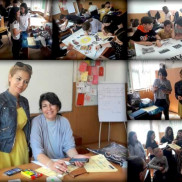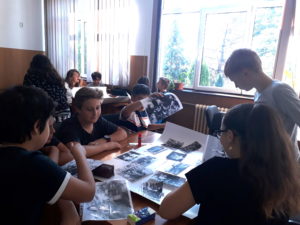Cerasela Marin: Teaching the Holocaust in Romania

For Cerasela Marin, who teaches middle school history in in Campina, Prahova, Romania, the TOLI experience has enabled her to teach the Holocaust and had a major impact on how her students see others in an increasingly diverse society.
“There is very little in our school history books about the Holocaust in Romania”, she explained. This, despite the fact that over half of the 757,000 Jews living in Romania and territories it controlled were killed in the Holocaust. Romania was an ally of Nazi Germany and actively collaborated in the murder of its Jewish population.
For Cerasela, teaching the Holocaust enables her students to learn from the past to apply its lessons today. “Studying the Holocaust, students learn the dangers of labeling, stereotypes, prejudices, how they can lead to hatred and discrimination, they adopt attitudes to reject and combat all forms of discrimination.”
Cerasela’s school is located in an urban area in Romania, and while the students are mostly Orthodox, some are Catholic, Protestant and even Muslim. As a History teacher, she feels that her primary duty is to, “prepare students for life in society, to teach them to live together with others, to respect the dignity of every person beyond any differences.”
Her interest in the Holocaust led Cerasela to attend the TOLI seminar in Romania in the summer of 2016. Inspired by the seminar, Cerasela applied for a TOLI mini-grant, which was used to introduce students to the Holocaust through films, trips to the synagogues in Campina and Ploiesti, the museum and the Hebrew cemetery in Campina. Finally, students presented a collection of drawings, posters and collages to the local branch of the Historical Sciences Society of Romania. The impact on the students was so great that she applied again in 2018 and 2019.
Speaking about her experiences with TOLI, Cerasela notes that using the mini-grants “showed me that project-based learning, coupled with the advantage of increasing student motivation for learning, makes it possible for each student to… appreciate and respect human and cultural diversity.”
“TOLI-supported projects have offered us the opportunity to do more than to talk to the students about the Holocaust, [they] have allowed us to carry out a series of activities that… offer students the opportunity to get direct contact with issues related to the history and culture of the Jews in Romania.”
Despite the challenges, Cerasela remains hopeful.
“I teach with the hope that if my students become good people, the world will become better.”


